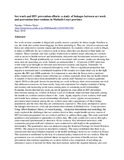| dc.description.abstract | Sex work in most countries is illegal and usually attracts a penalty for those caught. Needless to say, the trade also carries moral buggage for those practising it. They are viewed as outcasts and hence are subjected to extreme stigma and discrimination. In countries where sex work is illegal, it makes it difficulty for sex workers to seek re-dress when they are abused or their rights are violated. These countries also lack a policy framework to address issues affecting sex workers such as access to health services and information, education and development resources just to mention a few.
Though traditionally sex work is associated with women, studies are showing that more men are practising sex work. Indeed, an estimated that 5 - 10 percent of HIV infections world wide occur through sex between men between countries and regions. Nationally 14 percent of HIV infection is contracted through sex work. This is a significant proportion that requires a structured and a coordinated response if the country is to make head way in the fight against the HIV and AIDS pandemic. It is important to note that the Kenya lacks a national policy framework to address issues affecting sex workers especially those that are health related.
A number of factors have been identified by the current draft National sex workers guideline (April, 2010) as the push factors for practicing sex work in Kenya; short term economic survival that addressess resources for basic needs, long term aspirations for a higher standard of living and security and increasing social status among peers or sustaining social relationships. Economic factors that fuel sex work can not be ignored as a key pillar in HlV prevention interventions among sex workers in Kenya. Lack of economic empowerment especially among the female sex workers enslaves them to the . trade.
Again, majority of sex workers, both male and female have primary sexual relationships (husbands, wives, regular sexual partners) prevention intereventions among the sex workers must take cognonizance of these bridge populations and the risks that they are continuously exposed to. This study attempted to assess the linkages between sex work and prevention interventions in Malindi town - Coast province. Using Albert Bandura's theory of social learning _ (reciprical determinism and modelling) the study explored the challenges that sex workers faced as they sought health services, nature of HIV prevetion programmes for sex workers and how to address these gaps.
The study used both qualitative and quantitative approaches to collect data. The study conducted a survey through a semi structured questionnaire to interview 4S sex workers. Key informant interviews with community program staff and volunteers were conducted to add depth to the quantitative information. The quantitative data was analyzed using the Statistical Package for Social Sciences (SPSS). The analysis focussed on descriptive statistics. The study established that there is an unstructured and uncoordinated response to the health challenges faced by sex workers in Kenya. This assertion is reaffirmed by the lack of a national policy framework for sex workers. That the government was sex workers prefered choice in regard to provision of health services, that preventions interventions targetting sex workers lacked a key component of providing an alternative source of income for them, that interventions lacked the required intensity and were not scaled up to the national level.
Based on these findings, there is a need for the government to urgently come up with a national policy frame work to address issues affecting sex workers in Kenya. This process should be an all inclusive and people driven to promote ownership and community support for the policy implementation. In addition, the government, the NGO's and the civil society organizations should lobby the donor community and other bilateral partners to increase funding to HIV prevention interventions targetting sex workers to up-scale them to the national level. By doing so, the government will do away with piece meal interventions that ultimately have a minimal impact.
Other recommendations would be to build HIV prevention interventions that have strong components of livelihood skill building and access to micro-finance resources for the sex workers. This multi-faceted approach will ensure a paradigm shift from behaviour change communication to behaviour change and sustainability. | en_US |

